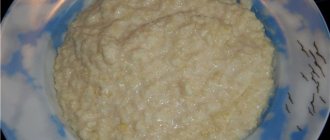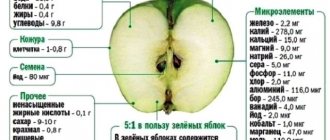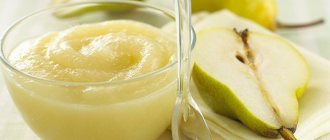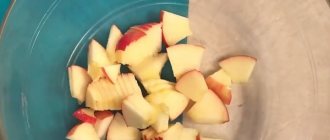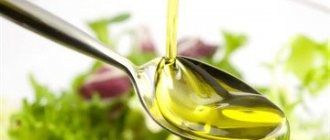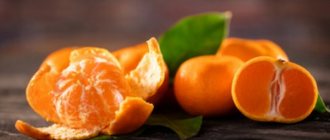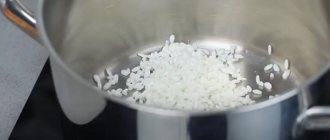The transition from breastfeeding or formula feeding to solid food is a gradual process and requires the attention of parents. Pediatricians recommend vegetables as first complementary foods. They do not require long-term adaptation, since they do not contain difficult-to-digest fats and amino acids. Cucumbers cause concern among mothers: the baby’s digestive system may not be able to cope with them. Does such a problem exist?
Photo: Depositphotos.com. Author: belchonock.
Composition and benefits
Cucumber is the leader among vegetables in terms of water content (mass fraction 95-98%). Includes up to 0.8% protein, 0.1% fat and 2.5% carbohydrates. The percentage of dry matter may vary depending on growing conditions: the degree of watering, fertilizer and soil composition. Contains fructose, plant enzymes, essential oils and vitamins.
Cucumber peel is a rich source of fiber, a natural adsorbent. It cleanses the intestines of a large amount of accumulated toxins. This property of cucumbers is especially important against the backdrop of deteriorating quality of baby food. In addition, cucumber peel contains carotene and ascorbic acid (in small quantities).
A unique component of cucumbers is tartronic acid. It inhibits carbohydrate metabolism and reduces the growth rate of fatty tissue in the body. Therefore, vegetables are included in the therapeutic nutrition program for obese children.
The vegetable contains folic acid and other B vitamins and carotene in small quantities.
Mineral components: silicon, potassium, iodine, sulfur.
- Potassium is responsible for the functioning of the cardiovascular and endocrine systems. In combination with sodium, it controls the water balance of the child’s body. If there is a lack of potassium, the child experiences slow growth of muscle tissue and may experience seizures.
- Iodine affects thyroid function. Participates in the development of the nervous system and mental abilities, helps in the formation of immunity. Iodine deficiency leads to serious problems in the body, the baby becomes lethargic and inattentive, and shows increased fatigue.
- Silicon ensures healthy skin, hair and nails. Its deficiency is fraught with the development of pathological conditions: anemia and softening of bone tissue.
- Sulfur is one of the five most important microelements for the body. Participates in the synthesis of certain proteins, including collagen. It is part of hemoglobin, therefore it affects the saturation of cells with oxygen and blood clotting. Sulfur deficiency leads to a general decrease in immunity - the child begins to get sick more often.
When and how can a child have fresh cucumbers?
- During the summer season, fresh cucumbers can be given to a child only after other types of vegetable purees, cereals, meat and fish purees and, most importantly, pureed fresh fruits and vegetables have been introduced into his diet - this usually happens by 9-10 months.
- For young children, it is necessary to peel the cucumber, this way the cucumber gets rid of most of the coarse fiber that irritates the intestines, harmful substances and nitrates, which mainly accumulate in the peel, and from impurities and microbes.
- A slice of cucumber can be given to a child only when he learns to chew well, i.e. from about 1.5 to 2 years old; before that, it is best to grate the cucumber first on a fine and then on a coarse grater so that the child does not choke. Among parents, there are many who like to let their child suck on a slice of cucumber, salted or fresh, it seems harmless to them, and the baby seems to be busy, it is better not to do this if the baby does not know how to chew - there is a great danger that he will choke.
- Up to 1.5 years old, it is better not to give a child a lot of cucumbers, limit it to 50 g per day (half a medium cucumber), from one and a half to 3 years old it is not recommended to give more than 100 g of cucumbers per day (1 medium cucumber).
- Fresh cucumbers stimulate the appetite and stimulate the secretion of the digestive glands, so cucumber salad is recommended to be given to the child at the beginning of the main meal.
- For better absorption of vitamin A, E, K and Beta-carotene, which are contained in cucumbers, it is recommended to season their salad with vegetable oil or sour cream (1-2 teaspoons per 100 g of cucumbers).
- It is useful to combine a salad of fresh cucumbers with a boiled egg, meat or fish.
At what age should it be given?
The first vegetable complementary food for a normally developing breastfeeding child is introduced at the age of 5-6 months. When feeding with infant formula - a little earlier, at about 4.5 months. But this does not mean that your baby’s introduction to vegetables should start with cucumbers.
From how many months should I give it? You should try to introduce cucumber into the children's menu no earlier than one year of age. Its fiber is coarser than that of carrots or zucchini (the first complementary vegetables). And the baby’s body does not produce enough enzymes to digest and absorb heavy dietary fiber, which leads to increased gas formation and colic in the baby.
But if the period of ripening vegetables is in full swing, and the child has a little time left before one year, then you can introduce him to a new taste a little earlier. But first make sure you don't have any food allergies. The rules are the same as when adding any new product to the diet.
You need to start gradually. First, a small piece of cucumber is peeled and pureed - this way it loses an impressive part of the coarse fiber. After feeding, carefully monitor the baby's condition. If there is no negative reaction, you can continue in the next days.
It is not recommended to combine two or more new products. Otherwise, you won’t be able to determine which food your baby’s body can’t cope with.
In any case, you should consult with the pediatrician observing the baby in advance.
How much and in what form do we give cucumber?
Let's look at two main points.
- First: how many cucumbers can a child eat, especially if he likes them?
- Due to the fact that cucumber in large quantities can give a laxative effect, you should not “overdo it” with it;
- For a child under one and a half years old, a portion of 50 g per day will be quite sufficient;
- By the age of three, this amount can be doubled;
- For the first test, the cucumber must be washed well and peeled. If the vegetable is grown in season and on your own plot, you don’t have to peel it;
- It is optimal to offer your baby grated cucumber, especially if he is not good at chewing or does not have teeth at this age;
- After a year and a half, you can give whole cucumbers.
By the way!
After a year, you can offer your child simple salads with cucumber. For example, with the addition of eggs, herbs, and a small amount of sour cream.
- The second important point is the desire of many mothers to treat their baby to pickled cucumbers (especially when fresh ones are not in season).
When can a child have pickles?
Take your time to accustom your baby to pickles.
Remember!
Until the age of 3, a large amount of salt is very harmful for a small body, first of all, it puts a strain on the kidneys.
But kids usually really like these dishes. And, having tried it once, they will beg for them constantly. Therefore, do not tempt your child with not very healthy food ahead of time.
But there are not so many benefits in salted or pickled cucumbers: almost all vitamins are destroyed during heat treatment.
- You can give pickled cucumber a try for about 1.5-2 years.
Give it later - only better. Marinades contain a large amount of vinegar and spices that irritate children's digestion.
If a child over one year old does not eat well, then you need to start not with giving the child something tasty to treat, but with correcting his food interest. At the age of 1 to 4 years, this issue is resolved successfully and quite quickly.
Harmful to young children
- Fresh fruits contain a lot of coarse fiber, which irritates the gastrointestinal tract of an infant and causes pain in the abdominal area, gas formation and stool upset.
- It can be difficult to wash off dirt from a green vegetable, which can cause the development of an intestinal infection in a baby.
- Even ground cucumbers can contain nitrates, which are dangerous for a small organism.
- Laxative properties are attributed to fresh fruits, so they are contraindicated in children prone to diarrhea.
- If your baby has gastritis, pancreatitis or biliary dyskinesia, cucumbers are prohibited and can cause serious harm.
How to choose the right cucumber?
For baby food, it is best to purchase ground cucumbers. Choose dense cucumbers with rich color and matte skin for your baby. Do not buy fruit that has bruises, cracks or stains. Excessively large (overripe) vegetables are also not suitable for feeding children.
Cucumber is a very healthy vegetable.
More than 90% of it consists of water. In addition, cucumber contains potassium, vitamins B, A, K, PP, ascorbic acid, phosphorus, copper, fluorine, calcium, carotene and other beneficial substances.
This vegetable is very popular in our diet. But the question is: when should you give your child cucumber? After all, it is no less useful for a small organism.
Allergy
Cucumber has long been considered hypoallergenic, and only recently have scientists begun to note cases of intolerance.
Factors that cause an allergic reaction in a child:
- Pollen provokes an increase in antibodies in the blood - class E immunoglobulins. The body mistakenly perceives pollen as a threat and releases a number of biologically active substances that cause allergy symptoms.
- Leaves and stems can provoke a negative reaction if they come into contact with the baby's skin.
- A cucumber, like a sponge, absorbs chemical compounds that are used to treat the soil and the plants themselves during the process of growth and maturation. In this case, herbicides, mineral and organic fertilizers become the cause of the allergic response.
The most common syndrome is oral cucumber allergy, which can occur in parallel with other types, for example, a reaction to ragweed blooms.
Local symptoms are often observed:
- swelling of the tongue, lip, or larynx;
- itchy throat;
- hives around the lips;
- stomatitis;
- itching and irritation in the mouth.
More severe symptoms include:
- runny nose and sneezing;
- redness and tearing of the eyes;
- acute abdominal pain, stool upset and nausea;
- anaphylactic shock or Quincke's edema.
In some cases, a cucumber allergy can be confused with a digestive disorder, which is accompanied by diarrhea and/or vomiting.
If one or more symptoms occur, you should seek help immediately. To eliminate symptoms, the doctor will prescribe antihistamines: diazolin, tavegil, etc.
Skin areas affected by urticaria are treated with topical medications: Zyrtec, Sinaflan.
Hormonal therapy is used to quickly relieve angioedema: prednisolone, hydrocortisone. The listed medications, as well as their dosage, can only be prescribed by a specialist.
Treatment also involves following a hypoallergenic diet and completely avoiding cucumbers.
Diet for urticaria in children - what to eat.
Disadvantages of introducing cucumber into complementary foods for infants
- Fresh cucumbers in the diet of nursing mothers can cause digestive problems in infants.
- Cucumbers should not be consumed by children with chronic diseases of the digestive system and kidneys.
- A baby may choke on a small piece of cucumber, as it is slippery and smooth. This especially applies to salted vegetables.
- Cucumbers bought at the store or market may be high in nitrates (read How to Avoid Nitrates).
- Eating this vegetable in pickled form can cause diarrhea, swelling, severe thirst and a rash in the baby.
Pickled and salted
Doctors do not recommend giving children under three years of age salty foods. But some kids love pickled cucumbers so much that their mothers ignore the warnings.
- Pickled vegetables contain vinegar and salt, which are harmful to young children. For example, vinegar destroys tooth enamel and irritates the baby’s nervous system. During the pickling and canning process, up to 80% of vitamins are destroyed.
- Lightly salted cucumbers retain more vitamins. They contain a certain amount of lactic acid, a natural prebiotic that creates a favorable environment for beneficial microorganisms in the gastrointestinal tract. But this product also contains a lot of salt.
Pickled (but not canned) cucumbers can be given to children over three years of age in limited quantities. It is better to wait until 5-7 years with pickled vegetables.
Are there any benefits from cucumbers?
Many people use this product solely for pleasure, without considering it very useful. Indeed, almost 95% of the mass of a cucumber is water. But this is not a sign of worthlessness. This vegetable contains a lot of fiber, sodium salts, potassium, zinc, copper, fluorine, phosphorus, vitamin C, K, and carotene. All substances are balanced and easily absorbed by the body.
Cucumbers promote normal intestinal function, stimulate the movement of food through the gastrointestinal tract, and prevent a feeling of heaviness in the stomach and constipation. Fresh cucumber is useful for children to develop chewing skills. In addition, it helps strengthen the body's immune defense, supplies the body with essential vitamins, and has a mild diuretic effect.
In hot weather, cucumbers quench thirst for a long time, refresh, and prevent a shift in the salt balance. This is extremely important for young children.
Tips for choosing
The main rule when choosing cucumbers for a children's menu is seasonality. In other words, it is best to introduce vegetables into a child’s diet during the natural maturation cycle. The results of a baby’s first acquaintance with new food are significantly influenced by its origin: ground cucumbers are perceived better than greenhouse and greenhouse cucumbers.
When choosing, conduct a visual inspection. Buy bright green specimens of an even shade, elastic and strong from the stem side, without bruises or cracks. Yellowish spots indicate that the fruits are overripe and are not suitable for food. Medium-sized cucumbers, up to 7 cm long, grown without chemicals are ideal. Large cucumbers often taste bitter.
Do not give fruit to your child if:
- there are black spots on the skin at the initial stage of decay: even by cutting off the damaged part, you will not be able to escape from dangerous bacteria;
- cracks are visible on the surface: harmful microorganisms have already entered the vegetable;
- The cucumbers are too wet, which means they were soaked in water to give them a fresh look and elasticity.
Choosing the right cucumbers
The choice of products for the children's table must be approached especially carefully, since digestive upset can be caused by any low-quality vegetable or fruit.
To choose the “right” cucumber for children, consider the following:
- It is useful to give your child only seasonal cucumbers grown in open ground (or better yet, on your own plot);
- Greenhouse products may contain nitrates and other substances that can cause intestinal upset and even allergies;
- Imported ones are even worse - they are stuffed with special compounds so that they survive long transportation and storage.
Therefore, it is extremely undesirable to introduce cucumbers into complementary foods in winter. And even more so - replacing fresh ones with pickled ones, I draw your attention to this again.
- Cucumbers should be medium in size, firm (not limp), have a matte skin and a rich natural color;
Know!
Deliberate gloss may indicate treatment with harmful substances, which cannot always be removed even after thorough washing!
- Cracks, yellowness, damage, bruises, stains (and even more so mold!) and other shortcomings are a reason to refuse the purchase in favor of the child’s health;
- Also, you should not buy cucumbers that are too large, overgrown or overripe.
Preparations for the winter
The secret to making baby-safe pickled cucumbers for the winter is to replace acetic acid with citric acid. The difference in taste is small, but the benefits are much greater. Adults will love them too.
To prepare the marinade you will need (the amount of ingredients is calculated for a three-liter jar):
- 2 tbsp. l. salt;
- 5 tbsp. l. Sahara;
- 1.5 tsp. citric acid;
- herbs and spices.
Cooking method:
- Place an umbrella of dill, a horseradish leaf, 1-2 cloves of garlic, 2 black peppercorns, several currant leaves (if the baby is not allergic to this plant component), and a bay leaf at the bottom of a 3-liter container.
- The entire volume of the jar is tightly filled with fresh, thoroughly washed cucumbers.
- The contents are poured with boiling water and left for 10 minutes, after which the liquid is drained, a new portion is brought to a boil, and the procedure is repeated.
- Salt, sugar and citric acid are added to the marinade, boiled, poured over the contents of the jars and rolled up with lids.
Cucumbers can be stored at room temperature. They can be safely given to a child over three years old until the next season.
Why are cucumbers not recommended for young children?
- Cucumbers are useful only fresh; when cooked, they lose almost all their beneficial properties.
- Only local ground cucumbers are useful in the summer season; greenhouse cucumbers can contain nitrates, so spring long cucumbers from the supermarket are often the cause of food poisoning and digestive disorders in children.
- Only young small cucumbers with green skin and small seeds are useful; yellowed large cucumbers with large seeds will not benefit the child.
So, a small child can only have fresh cucumbers in the summer season.
But fresh cucumbers
- They contain quite a lot of coarse fiber, which can irritate children's intestines and cause abdominal pain, bloating, and bowel disorders in the child.
- Fresh cucumbers are not always easy to wash, so they often cause intestinal infections in young children.
- Even ground cucumbers in the summer season can contain nitrates, which is especially dangerous for young children.
- Cucumbers have a laxative effect, so they are not recommended for children with a tendency to diarrhea, but they are recommended for constipation.
- It is not recommended to give fresh cucumbers to children with diseases of the gastrointestinal tract: gastritis, pancreatitis, biliary dyskinesia.
Tomatoes vs cucumbers
This combination of products seems natural, but can be dangerous for children:
- Vegetables form different environments: cucumbers are alkaline, tomatoes are acidic. Combined use leads to increased salt formation, which is harmful to the kidneys.
- Ascorbinase in cucumbers destroys vitamin C. By combining foods, you reduce your intake.
- To digest these vegetables, different enzymes are required, which neutralize each other. Fermentation processes occur in the gastrointestinal tract, which causes increased gas formation and puts a serious burden on the liver.
Tomatoes can be introduced into a child’s diet from one year of age, provided that he tried tomato juice 2-4 months ago and it did not cause an allergy. The drink should be given separately from dishes with cucumbers.
Trying to diversify the children's menu, parents prepare healthy vegetable salads. But cucumbers and tomatoes are not the best combination for a child’s stomach. Such salads are introduced into the diet last, when the child turns three years old. Moreover, sour cream dressing is prohibited - only a drop of vegetable oil.
Such a healthy cucumber
We have known since childhood that eating cucumbers is good for digestion because they contain fiber. And from our own experience, we managed to make sure that they perfectly quench thirst in the heat and are quite filling. But the benefits of the vegetable are not limited to this. Cucumbers contain a considerable amount of useful substances:
- vitamin C, so necessary for immunity;
- potassium (good for the cardiovascular and nervous systems);
- sulfur is also necessary for the nervous system, improves metabolism, strengthens the immune system;
- silicon is needed for nails, hair, skin;
- iodine is an essential element for the normal functioning of the thyroid gland, and therefore for the protection of the entire body;
- carotene – serves to prevent cancer, is good for skin and vision.
And all these benefits can be obtained from an ordinary cucumber if you give it to your child to eat occasionally. But it is still worth following the recommendations of experts on the age at which this vegetable can be introduced into the diet of children, since consumption too early can be simply harmful.

